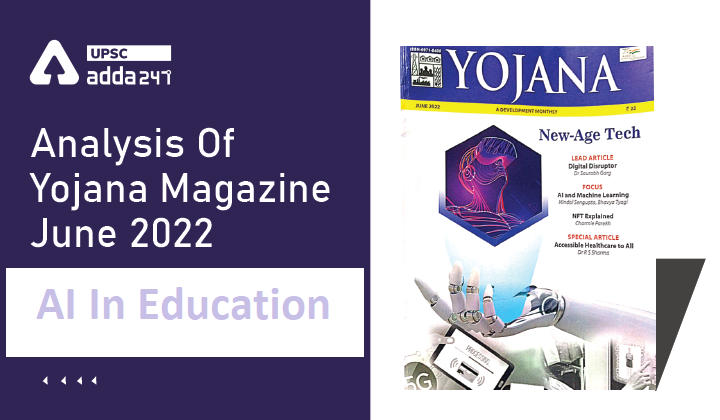Table of Contents
Yojana Magazine is a very important and indispensable source for UPSC Civil Services Exam Preparation. Here, we come with ”Analysis Of Yojana Magazine” which covers the monthly Yojana Magazine keeping in mind the demand of UPSC, particularly from the topics of important government schemes.
In ‘‘Analysis Of Yojana Magazine,” we cover each and every topic of the Yojana edition of a particular month and provide an easy-to-understand gist.
This topic-wise analysis is prepared from June 2022 edition of the monthly Yojana Magazine.
Introduction
- The UGC has recently recommended the application of modern teaching techniques which include hybrid mode.
- In this scenario, Artificial Intelligence (AI) has the potential to address some of the biggest challenges in education today, innovate teaching and learning practices, and ultimately accelerate the progress towards SDG 4.
- However, these rapid technological developments inevitably bring multiple risks and challenges, which have so far outpaced policy debates and regulatory frameworks.
About AI
- Artificial Intelligence (AI) uses the ability of the computer or computer-enabled system to process the information and produce outcomes similar to human rational behaviour for solving the problem and for decision making.
- The goal of AI is to make smart computer system like humans to solve complex problems.
- The technology can be applied in education system.
Applications Of AI in Education
- Robot Teachers
- Personalised Education
- Tutoring
- Automated Grading System
- Natural Language Processing
- Administrative Tasks
- Creation Of Smart Content
- Multilingual Teaching
Beijing Consensus On AI
- Representatives from the UNESCO’s Member States, international organizations, academic institutions, civil society and the private sector have adopted the Beijing Consensus on Artificial Intelligence and Education, at the International Conference on Artificial Intelligence and Education held in Beijing in 2019.
- It is the first-ever document to offer guidance and recommendations on how best Member States can respond to the opportunities and challenges brought by AI for accelerating the progress toward SDG 4.
- The Consensus reaffirms a humanistic approach to deploying AI technologies in education for augmenting human intelligence, protecting human rights and for promoting sustainable development through effective human-machine collaboration in life, learning and work.
- The Consensus details the policy recommendations on AI in education in five areas:
-
- AI for education management and delivery;
- AI to empower teaching and teachers;
- AI for learning and learning assessment;
- Development of values and skills for life and work in the AI era; and
- AI for offering lifelong learning opportunities for all.
- It also elaborates recommendations corresponding to four cross-cutting issues:
- Promoting equitable and inclusive use of AI in education;
- Gender-equitable AI and AI for gender equality;
- Ensuring ethical, transparent and auditable use of education data and algorithms; and
- Monitoring, evaluation and research.



 TSPSC Group 1 Question Paper 2024, Downl...
TSPSC Group 1 Question Paper 2024, Downl...
 TSPSC Group 1 Answer key 2024 Out, Downl...
TSPSC Group 1 Answer key 2024 Out, Downl...
 UPSC Prelims 2024 Question Paper, Downlo...
UPSC Prelims 2024 Question Paper, Downlo...
